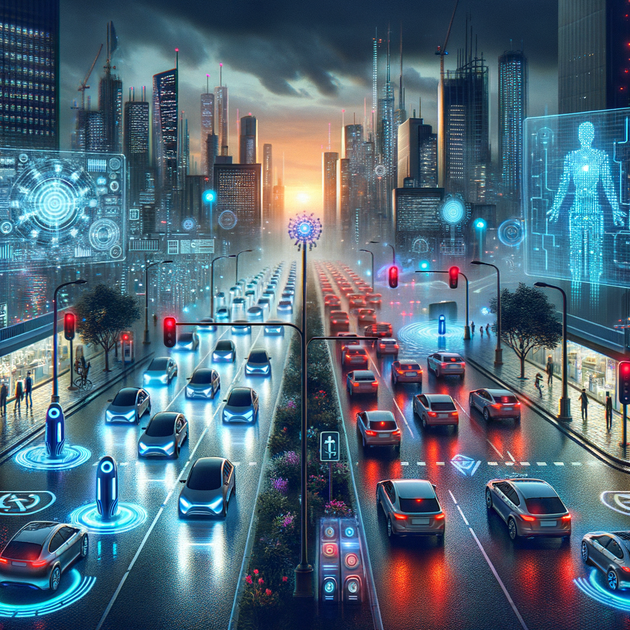Are Autonomous Vehicles Leading Us to Unexpected and Dangerous Discoveries?
Imagine a world where autonomous vehicles dominate the roadways, seamlessly navigating through traffic, eliminating human error, and providing convenience for all. While this image is appealing, a deeper concern lingers beneath the surface – could the pursuit of autonomous vehicles inadvertently unlock knowledge that we might rather have left undiscovered?
The Temptation of Forbidden Knowledge
For centuries, humanity has questioned whether there are realms of knowledge best left unexplored. This concept, often referred to as forbidden knowledge, suggests that certain discoveries could have detrimental effects so severe that they outweigh any potential benefits.
An age-old example of such knowledge is the atomic bomb. The scientific breakthroughs that led to its creation also unleashed catastrophic potential, demonstrating the double-edged nature of technological advancement.
Artificial Intelligence: The New Frontier
As we delve deeper into the era of Artificial Intelligence (AI), these concerns resurface, particularly in developing autonomous systems like self-driving cars. AI has the power to revolutionize industries, but it also raises ethical and existential questions. Can AI development lead us to forbidden knowledge?
Today’s AI, especially in autonomous vehicles, relies on sophisticated algorithms and machine learning models to make decisions. These systems have demonstrated capability, but can they also lead us down precarious paths?
The Ethics of Developing AI for Autonomous Vehicles
One of the paramount concerns involves the ethical implications of AI in autonomous vehicles. AI must navigate real-world scenarios where decisions can mean life or death. For instance, in an unavoidable accident scenario, how should an AI system decide whom to protect? Such ethical dilemmas are challenging even for humans, let alone computer algorithms.
The pursuit of AI for autonomous driving also risks incorporating biases. If AI models are trained on biased data, the resulting systems can perpetuate and amplify these prejudices, leading to unjust outcomes.
Human Common Sense vs. AI Logic
One inherent advantage humans hold is common sense reasoning. Unlike AI, humans intuitively navigate uncertainties and make decisions based on a broad understanding of the world. Efforts to endow AI with a similar level of common sense have so far seen limited success.
The gap between human common sense and AI’s current capabilities begs the question – could future advancements that bridge this gap reveal new and potentially dangerous knowledge about cognitive functions?
Autonomous Vehicles and the Knowledge Dilemma
True self-driving cars, classified as Level 4 or Level 5 autonomous vehicles, operate without human intervention. These vehicles rely entirely on AI systems to perform the driving task, including making real-time decisions in complex environments.
This reliance on AI introduces the possibility that in striving for higher levels of autonomy, we might stumble upon forms of knowledge with far-reaching consequences.

Today’s AI systems in self-driving cars are not sentient; however, developing more sophisticated AI could involve understanding human cognitive processes to a greater degree. Each step towards more advanced AI brings us closer to potentially uncovering hidden facets of cognition that could redefine our understanding of intelligence and decision-making.
If achieving full autonomy in vehicles necessitates breakthroughs that tread into uncharted cognitive territories, we must proceed cautiously and consider the ethical ramifications of such discoveries.
A Future of Ethical AI Development
AI’s potential benefits in reducing traffic fatalities and providing mobility for all are tremendous. Nevertheless, the journey towards fully autonomous vehicles must be guided by strong ethical principles and a thorough understanding of potential risks.
It’s essential to establish comprehensive AI ethics frameworks, ensuring that the development and deployment of autonomous technologies prioritize human safety, fairness, and transparency.
Collaborative Efforts and Regulation
Development of autonomous vehicles requires collaboration between tech companies, regulatory bodies, and society at large. Establishing common standards and regulatory measures can help mitigate risks associated with AI advancements.
Conclusion: Balancing Innovation with Caution
As we stand on the brink of an autonomous future, the lure of forbidden knowledge reminds us of the need for cautious optimism. The development of AI and autonomous systems should strive to harness advancements that benefit society while being vigilant about the potential risks.
Engaging in open dialogues, fostering a culture of ethical consideration, and maintaining a balance between innovation and caution will be vital steps in ensuring that our quest for knowledge does not lead us astray.
What are your thoughts on the ethical implications of autonomous vehicle development? Share your insights and join the conversation.
